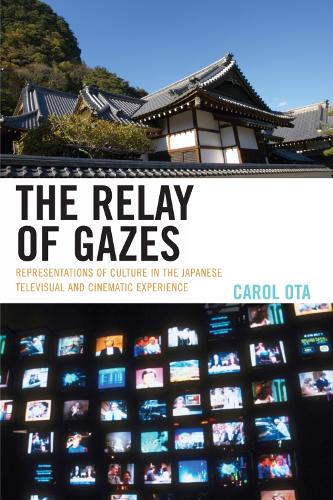
The Relay of Gazes: Representations of Culture in the Japanese Televisual and Cinematic Experience
(Paperback)
Publishing Details
The Relay of Gazes: Representations of Culture in the Japanese Televisual and Cinematic Experience
By (Author) Carol Ota
Bloomsbury Publishing PLC
Lexington Books
3rd October 2007
United States
Classifications
Tertiary Education
Non Fiction
Media studies
791.430952
Physical Properties
Paperback
128
Width 153mm, Height 228mm, Spine 10mm
200g
Description
The Relay of Gazes is a study of multimedia representations of Japanese culture in the latter half of the twentieth century. Carol Ota examines the way these representations changed and reflected social and personal concerns during a period of accelerating globalization. Analyzing the "gaze" or perspectives represented in these films and television programs, Ota determines that these gazes converge at many unexpected places. Ota concludes that the films share an assumption of the social centrality of television in shaping the gaze, but more importantly she demonstrates how the films and television programs are in line with concerns of traditions of past eras. The Relay of Gazes is a multidisciplinary text that is appropriate for all levels of readers and focuses primarily on Japan studies and film.
Reviews
Carol Otas The Relay of Gazes is at once a study of contemporary Japan and Japanese culture, of media representations, and of the construction of places. Drawing upon a wide range of theorists, but especially John Urry, James Howard Kunstler, and Michel Foucault, she lays out the ways in which the gazes of the insider, the visitor, and the outsider, directed at Japan, tell us something important about each. In these multiple gazes Japan is alternately modern and primitive, a place within which people are rootless or rooted. In the gaze of the media, attempts to see the 'real' Japan inevitably turn in on themselves, telling us as much about the viewer as the viewed. Ota lays out her account through a series of case studies, of contemporary Japanese cinema and anime, of travel narratives and film musicals, and of television news reporting. Sensitive and thoughtful, the cases are certain to make the reader want to go back to the originals, to view in a new light, whether for the first time or onceagain, the materials of which she writes. The volume is sure to be of interest to students of film, television, and new media. But it should also be useful to those interested in contemporary East Asia, and more broadly in the nature of globalization. -- Michael R. Curry, University of California, Los Angeles
Carol Otas The Relay of Gazes is at once a study of contemporary Japan and Japanese culture, of media representations, and of the construction of places. Drawing upon a wide range of theorists, but especially John Urry, James Howard Kunstler, and Michel Foucault, she lays out the ways in which the gazes of the insider, the visitor, and the outsider, directed at Japan, tell us something important about each. In these multiple gazes Japan is alternately modern and primitive, a place within which people are rootless or rooted. In the gaze of the media, attempts to see the 'real' Japan inevitably turn in on themselves, telling us as much about the viewer as the viewed. Ota lays out her account through a series of case studies, of contemporary Japanese cinema and anime, of travel narratives and film musicals, and of television news reporting. Sensitive and thoughtful, the cases are certain to make the reader want to go back to the originals, to view in a new light, whether for the first time or once again, the materials of which she writes. The volume is sure to be of interest to students of film, television, and new media. But it should also be useful to those interested in contemporary East Asia, and more broadly in the nature of globalization. -- Michael R. Curry, University of California, Los Angeles
Author Bio
Carol Ota has a Ph.D. in film and television from the University of California, Los Angeles. This is her first book.
